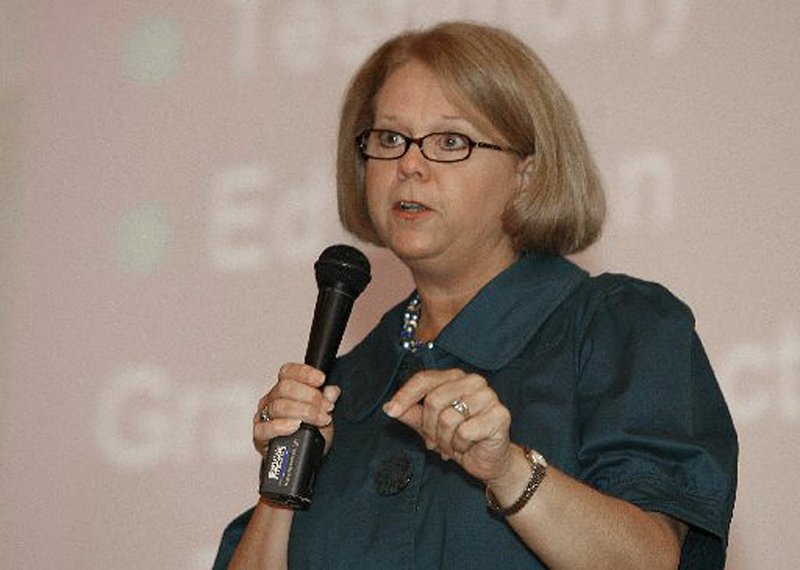WASHINGTON — Rhonda Sanders of the Arkansas Hunger Relief Alliance wasn’t surprised when a survey by Tyson Foods showed that most Americans think hunger is a serious problem - in communities other than their own.
Sanders sees that perception regularly in her work as executive director of the organization coordinating a half-dozen food banks throughout the state.
“People do not really recognize hunger,” she said. “They care about it, but they don’t always realize who it is. They think it’s someone across town or across the state.”
The survey on Americans’ knowledge, experiences and attitudes regarding hunger also found that about one in four adults nationwide - 24 percent - worry about whether they’ll have enough money to put food on the table during the next year.
Forty-eight percent of disabled Americans and47 percent of unemployed Americans said they worry about not having money to buy food.
Those worries are also found in Arkansas, where food providers have seen a marked increase in the need for their services and a demographic change in who has needed them during the economic recession. Food banks and food pantries across the state served more than 433,000 people in 2009 - a 50 percent increase since 2005.
While many more people have needed help, they were “not the usual suspects,” said Ed Nicholson, Tyson’s director of community relations, who is involved with the company’s hunger-relief program. Tyson commissioned the survey along with the Food Research and Action Center, a Washington-based nonprofit group that works to improve nutrition and eliminate hunger.
Many of those seeking help, Nicholson said, are people facing “hard choices” at the grocery store and dinner table, “especially in this economy, but not just in this economy.”
“A lot of these people are not very visible because their pride won’t let them talk about it,” he said. “Hunger is a problem that is among us, but one we don’t recognize because it’s not discussed as much.”
That’s also been the experience of Laura Rhea, chief executive officer of the Arkansas Rice Depot, a food bank in Little Rock.
In a video on the website for Tyson’s “Know Hunger” campaign, Rhea recalled how there was a time when “my husband and I thought that people who didn’t work probably shouldn’t eat. We never understood that it could be us.”
But after futilely searching for jobs, “things got so hard in our life that we ran out of food.” What little was left,Rhea gave to her daughter.
“The next day I swallowed my pride, and I went to a food bank,” she said. “It was the hardest thing I’ve ever done, but I was never going to let my daughter go hungry.”
Rhea’s story is featured on the website, along with some other Americans who have experienced food hardships. Some are well-known, such as sports commentator Spencer Tillman and television chef Sandra Lee.
Tyson, the nation’s second-largest food-production company, wants to use its anti-hunger campaign and the survey to stimulate conversation about the issue, Nicholson said. The company is also donating 1 million pounds of boneless chicken to 37 food banks across the country during March, including to the Northwest Arkansas Food Bank.
“People do think hunger is a serious issue,” said John Tyson, the company’s chairman. “They’re willing to become involved. But they also need to be shown how it directly impacts their own communities. We believe creating more awareness creates more involvement.”
Public perceptions about hunger are important, Nicholson said, when it comes to donations. When a majority of Americans think it’s not a problem in their own communities, he said, “it’s a real barrier to people becoming as engaged as they need to be.”
Sanders said, “we continue to educate people on hunger,that it’s not just the starving child in Ethiopia.” She said, “it could be a missed meal during the day or during the week. It could be having to make choices at the grocery store” to buy fewer items and to stretch smaller portions.
The Tyson survey found that while 65 percent of Americans view hunger as a serious national problem, the same number say it is less serious in their communities than it is nationally. Just 35 percent rate hunger as a serious problem in their communities.
“People are compassionate. They truly are,” Sanders said. “But they don’t believe hungry people” are their neighbors.
Among the first people to notice a hunger problem in their neighborhoods are those who work with schoolchildren and senior citizens. Sanders said teachers can pick out those students who arrive without having eaten breakfast.
Sanders related the story of two Arkansas children who showed up at school during a snowstorm this year. When the custodian told them they were lucky because school had been canceled, “they were disappointed,” she said, “because they didn’t know where they were going to get lunch.”
The Tyson survey also found that more than a third of Americans - 35 percent - said they personally know someone who has experienced hunger in the past year.Of those:
8 percent said it was they who experienced hunger; 9 percent said it was an immediate family member; and 8 percent said it was an extended-family member. Another 6 percent said it was a co-worker; 22 percent said it was a friend, neighbor or church member.
30 percent of suburban, 36 percent of rural and 37 percent of urban residents said they personally knew someone who had experienced hunger.
32 percent of whites, 43 percent of blacks and 46 percent of Hispanics said they knew of someone who had faced hunger in the past year.
The findings came from a telephone survey among 1,509 adults conducted Feb. 8-15 by Hart Research Associates. It has a margin of error of plus or minus 2.5 percentage points.
Arkansas, Pages 7 on 03/28/2011
